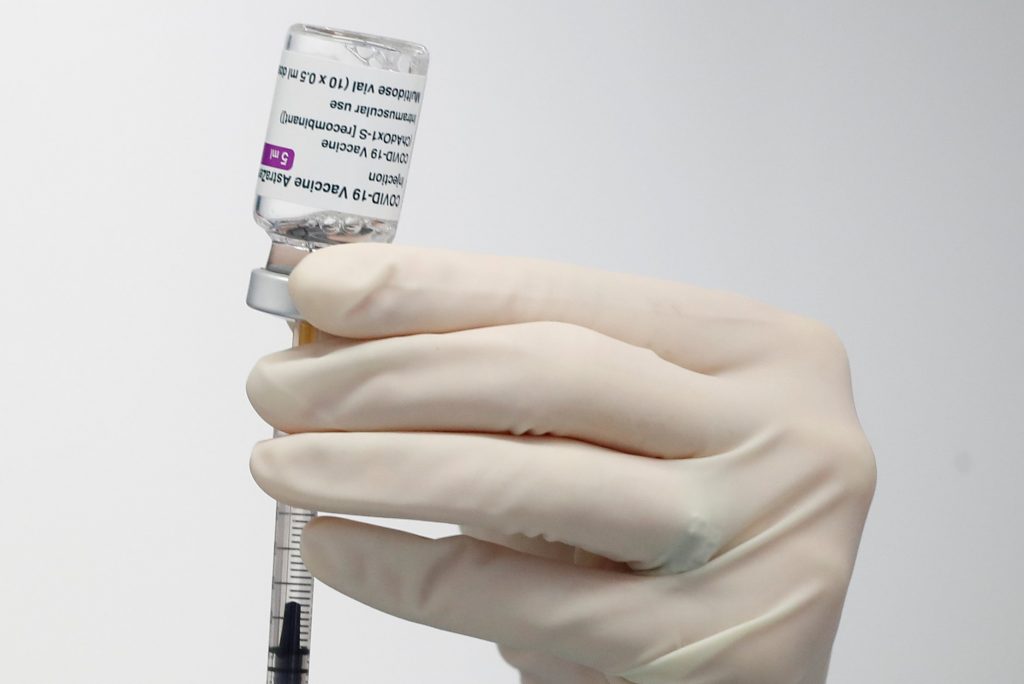As Catholic colleges grapple with how to reopen in the fall, many are already saying they will require their students to be vaccinated for COVID-19 and some schools are also mandating that staff members be vaccinated.
"Our goal is simple and twofold: to provide a COVID-safe environment in which our students, faculty and staff can pursue our mission; and to help protect the health and safety of our off-campus neighbors," said Jesuit Father Joseph McShane, president of Fordham University, in an April 16 letter to the college community explaining that all students need to be vaccinated --"with some considerations for medical and religious exemptions" -- by the start of the fall semester.
He noted that the pandemic year has been difficult for the campus community and its families and that the threat of COVID-19 still continues as more contagious strains are spreading.
"However, we see a path to the end of the pandemic. That path is vaccination," he wrote. He also said the university would be providing vaccinations on campus this spring and for international students when they arrive if they were not able to be vaccinated in their home countries.
The number of private colleges requiring COVID-19 vaccinations continues to grow, numbering about 75 on April 27 on a list updated by the Chronicle of Higher Education.
Only a handful of public universities initially said they would mandate the vaccine but by late April, this started to change as several big universities, following the decision of University of California and California State University to require students to be vaccinated for the fall semester.
Other Catholic universities with fall COVID-19 vaccine requirements include Georgetown University in Washington, Assumption University and Holy Cross College in Worcester, Massachusetts, Boston College, Chicago's DePaul University and Loyola University Chicago, Seattle University, St Mary's University in Notre Dame, Indiana as well as the University of Notre Dame, Trinity Washington University, the University of San Diego and Le Moyne College in Syracuse, New York.
St. Edward's University in Austin, Texas, was one of the first colleges to announce in late March that it was requiring students and faculty to be vaccinated for COVID-19.
On its website, it says the school's policy is "aligned with federal, state and local laws and committed to ensuring the health and safety of all students, faculty, staff, campus guests and the greater Central Texas community."
It also said it will provide exemption for students and employees "related to religious beliefs, underlying medical conditions" and concerns associated with the vaccine's emergency use authorization granted by the nation's Food and Drug Administration before the vaccines are formally approved.
The school is following similar procedures for proof of vaccination as it does with the state law requiring students to show proof of their meningitis vaccination.
A message to the DePaul community from its president, A. Gabriel Esteban, said the university was requiring its students to be vaccinated for COVID-19 this fall "in the spirit of caring for each other and for our surrounding community." To that end, the school was providing a vaccination clinic on campus at the end of April.
He said the university had not yet decided if it will require employees to be vaccinated but noted that in a school survey in February, "the vast majority of our faculty and staff already have received or plan to receive a COVID-19 vaccine."
The University of Notre Dame, which similarly issued a requirement for students to be vaccinated by the fall announced April 15 that 90 percent of its students had received their first dose of the COVID-19 vaccinations and a result the school would be loosening some of its restrictions on gatherings and wearing masks outdoors.
Many schools and universities are still determining their vaccine policy for the fall.
At Marymount University in Arlington, Virginia, which hosted a mass vaccination clinic April 21 in the campus gym, the university's president, Irma Becerra, said school officials are "evaluating every day the issue of requiring vaccines or not."
She said the university, which is currently operating in a hybrid mode with a mix of in-person and virtual classes this year, plans to resume completely in-person in the fall, which she said is how the students have said they learn best.
"This is a very important and necessary step for our return to normalcy," she said of the vaccine clinic that was part of a partnership with Safeway grocery stores and the Army's National Guard.
She also said that 80-90% of students have expressed a willingness to be vaccinated, which is why the university wanted to make it easier for them by providing the vaccinations on campus.
"I hope everyone can get it and we can once again have social lives -- you know, just be back together," said senior communications major Ana Schneider Jerez from Málaga, Spain.
Lorena Gonzalez, a sophomore biochemistry major, said she woke up that day excited to get the vaccine.
"Everyone is eager to get vaccinated so we can get back to somewhat of a normal life," she told Catholic News Service just after getting vaccinated.
The student, who had tennis practice about an hour after her Pfizer shot, hoped her arm wouldn't be numb. But mostly, she had a sense of relief from getting the vaccine and just hoped others would get theirs too.
Gonzalez, who had COVID-19 a year ago and was sick for a few weeks, said young people need to accept the fact that the coronavirus is serious, and people can't be indifferent about it.
"I would love for other students and faculty to get vaccinated," she said, adding: "It's the only way return to normal life again."
Contributing to this report was Chaz Muth in Arlington.

